I have just published a book called The Re-Justification of God.
Here’s the cover:
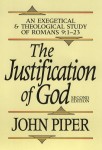 It is probably the ugliest book cover I have ever designed, but if you compare it with the cover from John Piper’s book on the right, you’ll see why I created the cover as I did.
It is probably the ugliest book cover I have ever designed, but if you compare it with the cover from John Piper’s book on the right, you’ll see why I created the cover as I did.
Why did I write The Re-Justification of God?
Ever since I read John Piper’s The Justification of God about twenty years ago, I have wanted to write a book in response called The Re-Justification of God.
Why?
I believe that Piper’s book does more to malign the name of God and His character than uplift and glorify it. To put it bluntly, I don’t think Piper’s book does anything to accomplish “The justification of God” but actually does the opposite!
So I wanted to write a book which explains Romans 9 in a way that presents God in light of Jesus Christ, in a way that does not make God responsible for hating Esau, hardening Pharaoh’s heart, and condemning a large majority of mankind to everlasting damnation in hell.
Look, I have great respect for John Piper, but much of his theology really gets my blood boiling, and this book of his on Romans 9 was no exception.
But it wasn’t just his book. Most of the explanations of Romans 9 I have read from Calvinists seem to be completely off track and do more to undermine the character of God than glorify it.
So in light of all the bad theology that has been taught from Romans 9, I wanted to write a book that explained the text of Romans 9 in a way that truly presents God in the light that Paul presents Him, as a God of light, love, mercy, grace, and longsuffering toward all.
That would be a great book, right?
Well, guess what?
Despite appearances, the book I just published is not that book. My The Re-Justification of God is not a point-by-point refutation of Piper’s The Justification of God. My book is not even a point-by-point refutation of the typical Calvinistic understanding of Romans 9. That is the book I set out to write, but it is not the book I am announcing here.
…Sorry to disappoint you.
However…
…My book IS the first draft in what will hopefully become that book.
While I believe my new book does provide an overall big-picture analysis of Romans 9:10-24 that is neither Calvinistic nor Arminian, and while I believe my book provides logically and theologically sound explanations for why God “hated” Esau, why God hardened Pharaoh’s heart, and how God treats the “vessels of wrath” destined for destruction, I was not able to provide ALL the scholarly and exegetical details that a book like this requires.
So this book is the brief summary of the book I initially set out to write so many years ago. It is not finished, however. It is less than half-way done. Oh, the ideas are all there, but the book contains very little of the exegetical evidence which is needed to defend the ideas.
So why am I publishing this book now if it’s not done?
In the opening pages to this new book, I explain why, but in a nutshell, the reason is that if I didn’t publish it now, it would probably never get done. Also, having the book out there allows people to respond to it and interact with it so that in a future edition I can correct or attempt to better explain the ideas I present in the book.
And following the theme in the cover image above, here is an image of some of the edits I performed on this manuscript:
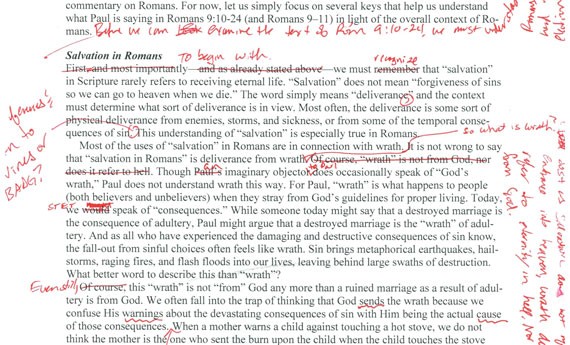
As with many of my books, there are probably still several typographic mistakes in it. If you find some, please send me an email, or use the “Contact Me” section on my About page to let me know where they are so I can correct these mistakes in future editions of the book.
So how can you get and read this book?
This book is available for purchase on Amazon.
Once you have read it, let me know what you think by leaving a review on Amazon.
And hey, would you let others know about this new book by using the share buttons below? Thanks!


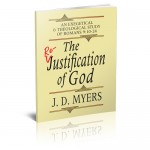
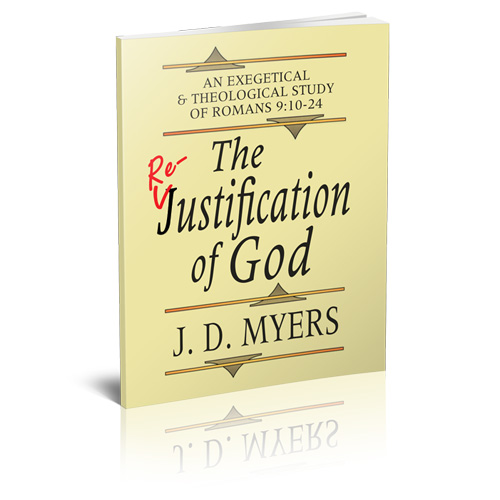
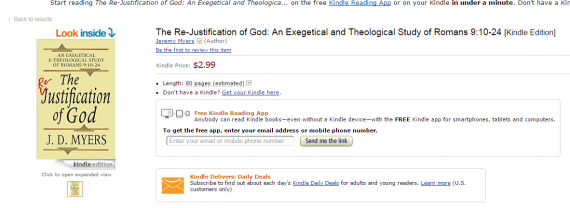

I’ve always wanted to write a response to that book, but really I just wanted someone to do it from a FG perspective. Thanks for doing the work!
Well, my book is not done, so you can work on yours, and then when I get around to finishing mine, I can cite the research done in yours! So get to work! 😉
I’m a few pages in. Like what I’m reading so far.
Thanks for reading it and for the feedback.
Just bought mine.
Just love Romans 9!
Ah, J.D. Myers! That’s the name that will stick. Not able to read the book yet, but hope to soon. Thanks for the copy.
Thanks! Let me know if you have feedback!
Thank you so much brother for blessing us with this book. The Lord has opened my eyes to so many things about His love for us through your writings. May God continue to bless the work of your hands.
Mark,
You have no idea how encouraging this comment was. Thank you very much. May God bless you as well.
Jeremy, looking forward to reading. Have always found Piper’s (and traditional Reformed Theology’s) explanation in Romans 9 to be full of problems. In fact, I have met many raised in those traditions who cannot even read Romans 9 because that cannot reconcile the picture of God there with the God they have come to know. There is little hope or real Good News in the view of God perpetuated by Piper et al.
FedEx
Right! I am hoping to restore hope to the Gospel of Hope! There is very little hope in some systems of theology.
In reading Jeremy Meyer’s _The Re-Justification of God_, I realized that one could analyze pericopes, using _The Communication Wheel_.
Working The Wheel
Clearly state what you are sensing:
* What do I see?
* What do I hear?
* What do I touch?
* What do I taste?
* What do I physically feel?
Clearly state what your thoughts are:
* Here is what I think is going on;
Clearly state what your current feelings/emotions are:
* I am glad;
* I am sad;
* I am mad / angry;
* I am frustrated;
Clearly state what your wants are:
* For your self;
* For the person one is addressing;
* For the people one is addressing;
* For other involved people;
* For other uninvolved people;
Clearly state what actions:
* You have taken in the past;
* You will take now;
* You will take in the future;
Using The Wheel
For every individual in the passage, Work The Wheel, responding on the basis of the content of the passage that is by, or about that individual. There will be parts of the wheel that one is unable to answer. Notate those passages. Using your Biblical software tools, locate other passages in the Bible, where the individual is present. Go through those passages, looking for information about how to fill in the blank parts of the wheel, for the individual.
I’m still testing this out. Thus far, it has had, shall we say, interesting consequences.
###
If you have to use a captcha, can please use one that is blind friendly. One that screen readers can read.
Hi J.D.: Thank you for this beginning version of your book. I am sending this two and a half years after this blog started. Do you have an idea when your more complete version will be available?
Also, is there another book you can recommend in the meantime? I would appreciate a response.
John D. Wagner
Dear J. D.
As a Doctor of Theology myself and very interested in every serious study of the Bible, it is always a delight to read whatever may have been written on different biblical topics. Having expertise in Hermeneutics (how to interpret the Bible), I encourage you to continue your “hard work” in studying the Bible.
However, do it without arrogance, as we see in your book. You seem, here and there, to be a man who realizes his inadequacy and humility in studying the word. To your advantage, there is a couple of allusions in your introduction that you don’t have the last word on Romans 9 (or anywhere else in the Bible). And you are right. Nobody has. We are all sinful creatures, even if we are saved by grace. However, on the other hand, you describe Calvinism as a pitiful way to read and understand the Bible, as if everything that was said since the Reformation should have been understood differently. Do you think that you are the one (with some others, of course) who, in modern days, has done his homework to finally arrive at a proper understanding of what Paul meant when he wrote Romans? Do you think that “salvation” has nothing to do with “eternal life” or “justification?” Wrath does not mean “wrath” but “consequences only of our sins.” Really! Do you think and believe that Paul was referring to something else? Well, it is no wonder that you did not include all your “deep exegesis,” which is not included in your book. If it were there, you would probably just give more ammunition to those who know how to do robust exegesis.
Challenging a man like John Piper and the Reformers is pretty much bold, and I wonder if you know who you are facing. Does it mean that Piper is better than you or that he is God? Not at all. But in terms of exegesis, I think you are not of the same caliber as him (no offense); nor am I. He’s one of the most solid in this field today. Sproul, Carson, and many other Calvinists are too, but we’re talking about Piper here.
I wonder what you understood when you were supposedly “Calvinist” for a while in the past. I wish I would hear you defending Calvinism at that time. Also, what was your understanding of Romans 9 at that time?
I encourage you not to bring to fruition the book you plan to write one day, if at all, about Romans. I think it would be a disservice to the Church of Christ. And I say it seriously.
This critique is quite severe; I admit it upfront. However, when someone seems to have grasped what profound theologians like the Puritans of old would have not gotten, it is pretty much bold on your part. Do you think all of them were wrong in understanding Romans 9? Well, asking the question is giving the answer at the same time.
May the Lord help you to be more aware of what you are doing in making the gospel a quasi opportunity to redefine the danger of the wrath of God, His grace, and mercy towards those who deserve nothing else but hell; (i.e., all of us). We are saved by pure grace, and like Jonathan Edwards said one day: “You contribute nothing to your salvation except the sin that made it necessary.”
But who knows! You probably disagree with that as well.